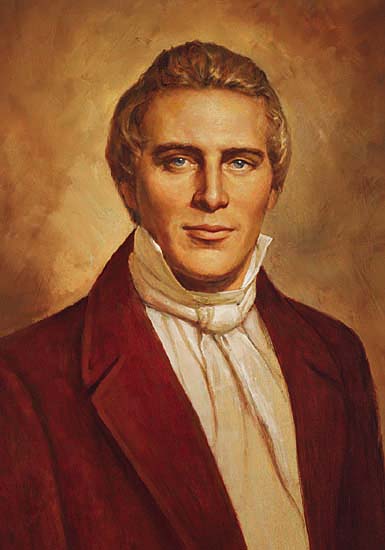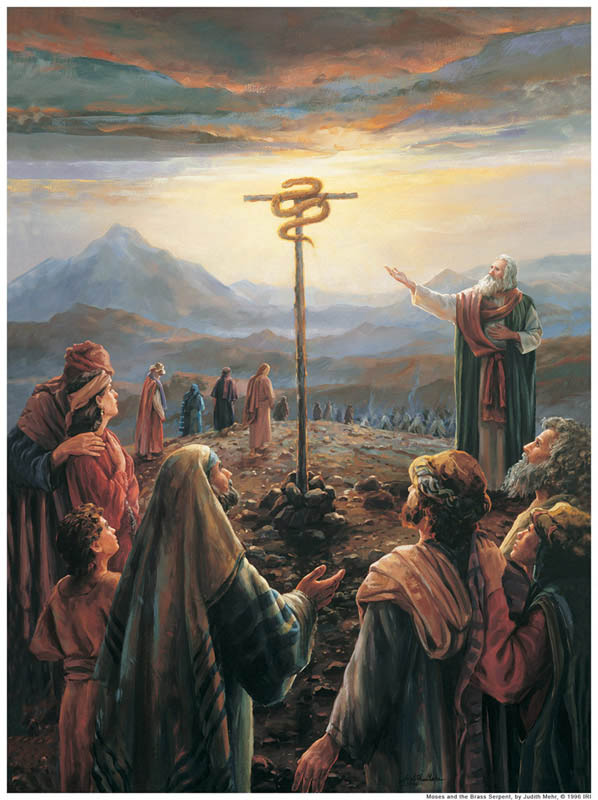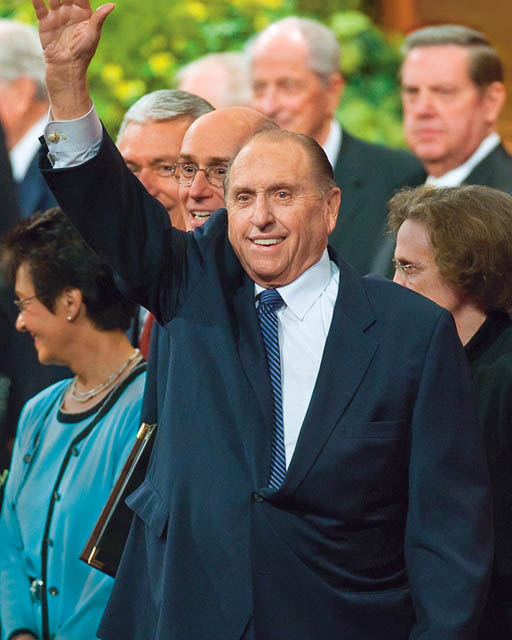Mormon Beliefs: Prophets
An informal survey of Americans asked the question "What is a prophet?" will bring some predictable responses. Many will name Nostradamus, who made predictions for the future, but a prophet's main role is not to foresee the future, but to call men and women to repentance and to preside over God's kingdom on earth. Many people, when asked the above question, will respond with the names of Old Testament prophets, and some Christians claim that John the Baptist was the last prophet on earth, but Acts 15:32 states, "And Judas and Silas, being prophets also themselves, exhorted the brethren with many words, and confirmed them." Thus, we know that there were prophets after Christ. The original twelve apostles were prophets, also.
A prophet is a man, called of God to a special vocation. As with all men, prophets are imperfect people. They must walk by faith, just like the rest of us. The Bible tells us of the despondency of Elijah and Jeremiah, the micro-managing leadership style of Moses, the family problems of Jacob (Israel), and the favoritism of Isaac for his less-worthy son. When prophets receive revelation, they still do not gain the complete perspective enjoyed by God, but are given insights specific to their calling and specific to their religious leadership. It is telling to eavesdrop on the Book of Mormon prophet, Alma, as he explains resurrection in around 73 B.C:
- I do not say that their resurrection cometh at the resurrection of Christ; but behold, I give it as my opinion, that the souls and the bodies are reunited, of the righteous, at the resurrection of Christ, and his ascension into heaven. But whether it be at his resurrection or after, I do not say; but this much I say, that there is a space between death and the resurrection of the body, and a state of the soul in happiness or in misery until the time which is appointed of God that the dead shall come forth, and be reunited, both soul and body, and be brought to stand before God, and be judged according to their works (Alma 40:20, 21).
The reader can see Alma piecing together information from revelation he has received as a prophet, and information gleaned from previous prophets.
Contents
The Prophetic Call
Joseph Smith’s prophetic vocation was to be an instrument in God’s hand to bring forth a restoration of the gospel, but because he was so young (14 years old when he had his first vision) he needed to grow up first. Joseph Smith was not perfect, and because of that, even though he was a prophet, the Lord chastised him for his weaknesses. He repented and overcame them. It took 10 years to restore the gospel from the time of the first vision. Joseph received many visits from angels and heavenly beings who personally instructed him in gospel teachings and principals. Lorenzo Snow, one of the contemporaries of Joseph Smith and later a modern president and prophet of The Church of Jesus Christ of Latter-day Saints, is quoted by George Q. Cannon in his journal (January 7, 1898, archives of the Church) as having said “I saw Joseph Smith the prophet do things which I did not approve of; and yet I thanked God that he would put upon a man who had these imperfections the power and authority which he placed upon him… for I knew I myself had weakness and I thought there was a chance for me… These same weaknesses did not impair them in my estimation I thanked God for their imperfections.”
There have been a few select individuals during the history of the world who received visions directly from God and his Son. Their experience and works have excited and assured us. Moses led the Children of Israel out of Egypt, away from slavery and to a new promised land. He also gave us the first five books of the Old Testament and recorded the Ten Commandments. Nephi in the Book of Mormon led his people out of the Jerusalem area, to a new land in the Americas 600 years before the birth of Christ. He not only colonized with his descendants, but also gave us important scriptures. As with Joshua of the Old Testament, a few Book of Mormon prophets were military leaders, as well.
The Duty of a Prophet
The specific duties as Prophet are outlined in modern scripture (See Doctrine and Covenants 107:65-67 91-92). We also know that God speaks to his children today just as he did in ancient times through his prophets. (See Luke 1:70.) We see that the primary vocation of a prophet is to be a leader and high priest of the holy priesthood. A prophet administers priesthood ordinances and sees to it that other holders of the priesthood do the same. He oversees temple ordinances and ensures they are done correctly. Mormons are famous for temples. Temples differ from chapels just as Solomon’s Temple was different from a synagogue.
Throughout scripture, in the Bible, Book of Mormon and other scripture, another primary duty of a prophet is not to foretell the future as supposed by popular culture, although, they also have that ability, and when it is God’s will, they warn us so we can prepare and do what is necessary, be it temporally or spiritually. Prophets tell and testify to us of the fullness of God and call us to a life of repentance, participation in the community of Christ, and admonish us to develop and exercise an active faith, perform service and nurture the virtues of justice and compassion.
Obedience and service have always been part of the sermons of the prophets. All have exhorted their followers to keep the commandments of God, which entails repentance. All prophets have issued a call for righteous living. They remind us of our obligation to ourselves and God. True to his prophetic vocation and calling, Joseph Smith reminded God’s children that if they strayed from their covenants, they would only find unhappiness and destruction. Elijah, Elisha, Jeremiah, Ezekiel are all examples of prophets in the Old Testament whose calling was to remind the Israelites that God had an un failing love for them and that they had a duty because of their covenants to demonstrate a concrete love for him through genuinely obeying his commandments.
When the Lord’s servants speak they are moved by the Holy Spirit and it is the same as the mind, will and voice of the Lord. (See D&C 68:3-5.) A prophet's voice is universal; hence he is not only a Prophet, but a seer, revelator and in The Church of Jesus Christ of Latter-day Saints, president of the Church. The Twelve Apostles of the LDS Church are also sustained by the membership as prophets, seers, and revelators, special witnesses of Christ. One of the callings of a prophet is to teach the truth, as it comes from God. John A. Widstoe an early church apostle, observed, "A prophet is a teacher. That is the essential meaning of the word. He teaches the body of truth, the gospel, revealed by the Lord to man."
The firth article of faith of the LDS Church states, “We believe a man must be called of God by prophecy, and by the laying on of hands, by those who are in authority to preach the gospel and administer the ordinances thereof.”
Mormons believe their prophet is literally called of God in fulfillment of prophecy by those with authority. Authority is very important to Mormons, who claim their priesthood authority from the early Apostles Peter, James, and John who were ordained as the “First presidency” during the ministry of Christ. These three appeared to Joseph Smith and Oliver Cowdery and literally gave them the Keys to the Kingdom in modern day.
In Doctrine and Covenants 27:12 Christ says ,
- “And also with Peter, and James, and John, whom I have sent unto you, by whom I have ordained you and confirmed you to be apostles, and special witnesses of my name, and bear the keys of your ministry and of the same things which I revealed unto them…”
Joseph Smith has passed those keys on to his apostles through a line of apostolic succession in the same way as Christ had done in the primitive Church. This means that the president of the "Mormon Church" and his apostles are modern day prophets and hold those same keys, which were lost through the gradual apostasy of the early Christian church.
In the LDS Church, the prophet occupies the role a seer and revelator as well the post of the president. This position is similar in nature to Moses among the Children of Israel. (See Numbers 12:6 God speaks through his prophets.) The president has two councilors to whom he may delegate authority as per his needs and those of the Church. He and his councilors are referred to as the First Presidency. Only the prophet may give direction and revelation for the Church as a whole, for that is his "stewardship." Additionally there are twelve apostles as were found in the primitive church established by Christ. Appointed by revelation, they fulfill a unique charge on the earth. President J. Reuben Clark Jr. described their responsibility:
- "Some of the General Authorities (a designation of Church leadership) have had assigned to them a special calling; they possess a special gift; they are sustained as prophets, seers, and revelators, which gives them a special spiritual endowment in connection with their teaching of the people. They have the right, the power, and authority to declare the mind and will of God to his people, subject to the over-all power and authority of the President of the Church." (see http://deseretbook.com/Voice-My-Servants-Apostolic-Messages-Learning-Teaching-Scripture-Scott-C-Esplin/i/5053251)
The Calling of a Prophet in the Scriptures
In the Book of Mormon, and the Old and New Testaments the calling of a prophet is not to tell the future. Many prophets are probably privy to situations that will occur in the future if men fail to live up to Gods commandments. These situations occur, but they are conditional on God’s people following their prophets and obeying or not obeying his commandments.
- See 1 Samuel 9:9 — a prophet is a seer.
- See the Book of Mormon, Mosiah 8:16-18 — a seer can know of things past and things to come.
- Amos 3:7 — God reveals his secrets to the prophets.
- Numbers 12:6 — A Prophet is God’s spokesperson.
Modern Prophets
God loves us just as much as He did His children in ancient times. He is very concerned about our personal welfare, and since he loves us all, he wants us to be happy. To do that, he has provided a road map that will lead not only to our personal happiness in this world, but also in the world to come, via the gospel, and living our faith and commandments that he has given us. His plan is called the Plan of Salvation.
Because of the fall of Adam, Christ becomes our mediator and we need a prophet to teach and guide us. This has been the scenario since the fall of Adam. Adam himself was the first prophet and he called his own children to repentance and taught them the gospel and the laws of God and what was expected of them.
Adam's time was unique from ours, and prophets are called to direct God's living church, so that special directives from heaven can help the children of God in their particular era of time and their particular culture. Examples of this include Jeremiah and other prophets at the time of the Babylonian Captivity. Their message was often distinctly geared to the problems at hand — wickedness, leading to the invasions by Babylon, seventy years of captivity, and then the prophesied return.
During the period of the restoration, Joseph Smith and some of his colleagues received direct revelations and instructions from the Lord. Smith recorded these revelations and instructions and created a book called the Doctrine and Covenants. Mormons also accept this additional work as canonical scripture.) One section, section 89, demonstrates how instruction from heaven can be directly pertinent to things immediately at hand. Section 89 is called the Word of Wisdom, and it states that due to conspiring men in the last days, the Lord warns and forewarns us not to partake of alcohol, tobacco, or "hot drinks."
Prophets Speak the Word of God
The Lord tells us through his Prophet “What I the Lord have spoken, I have spoken, and I excuse not myself; and though the heavens and the earth pass away, my word shall not pass away, but shall all be fulfilled, whether by mine own voice or by the voice of my servants, it is the same.” (See Doctrine and Covenants 1: 38.)
A prophet speaks on behalf of the Lord as his designated spokesperson to the people and is also a seer and revelator. (The revelations given in the D&C were given to Smith in his capacity as a revelator. A Seer is a person capable of seeing into the future as to what might occur if God's Children do not obey his commands.) Essentially, a prophet is a messenger of the faith; He leads followers to Christ, is a teacher and is invested with the proper authority of Christ, to act in his name, which is by definition is the priesthood. He proclaims the truth. He constantly reminds God’s Children who they are, and encourages them to live an active faith. He does this by leading the Church under the direction and guidance of the Lord and the Holy Spirit.
A prophet proclaims and preaches the word of God, especially when he is acting in his official capacity and he exercises his office as teacher and prophet from among, and to the benefit of the people of the church, and even those who are not in the Church. Thomas S. Monson is the Herald of God and for the followers of Christ is an authentic teacher invested with the authority of Christ. He proclaims to the world the truths of the faith that the true followers of Christ are to believe and live by, and operates by the light, power and guidance of the Holy Spirit. In his capacity as prophet, seer and revelator, he explains the teachings of the faith, organizes and disseminates those truths throughout the world by virtue of his priesthood authority and church organization, and brings forth a treasure house of revelation of both old and new.
Validating the Words of the Modern Prophets
When Latter-day Saints are confirmed members of the Church they are also given the Gift of the Holy Ghost. This is the constant companionship of the Holy Ghost, depending on continued worthiness. This was a gift given to the apostles after Christ’s resurrection.
Members of the LDS Church are to exercise this gift whenever they receive a message from the Prophet. They are to go to the Lord in personal prayer and supplication and receive their own witness of the truthfulness of the prophet's words directly from the Lord. It is with this spiritual witness that they gain the commitment to follow the prophet of God.


